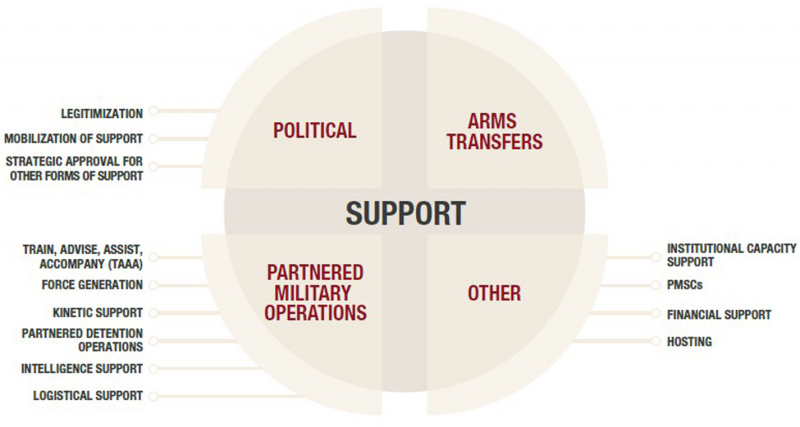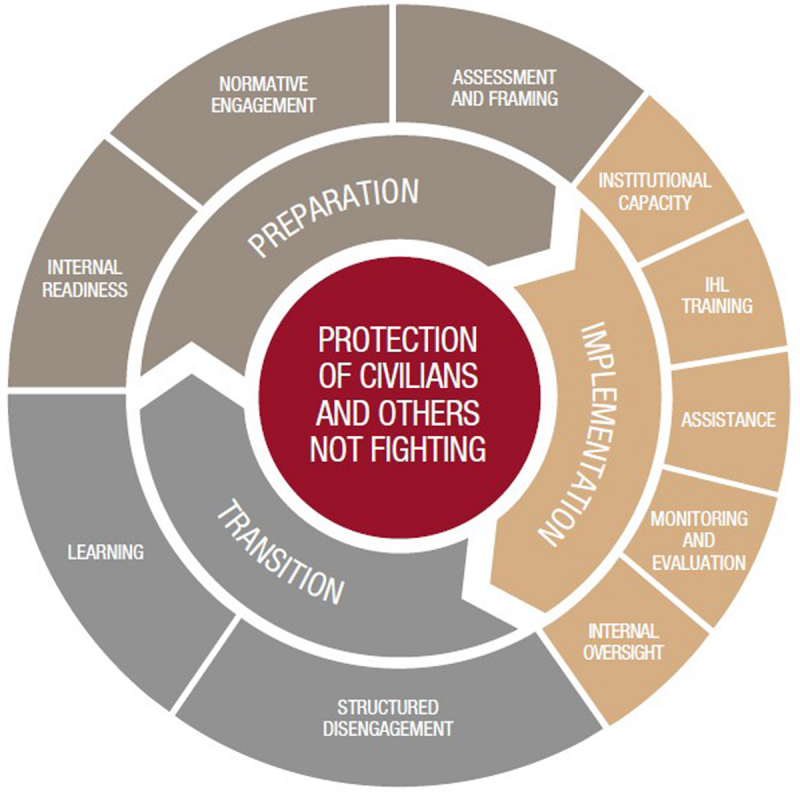Allies, Partners and Proxies: Managing Support Relationships in Armed Conflict to Reduce The Human Cost of War
Allies, Partners and Proxies: Managing Support Relationships in Armed Conflict to Reduce The Human Cost of War1
Armed conflicts feature an ever-growing number of actors organized in overlapping webs of alliances, proxy dynamics and other types of support relationships. And when armed actors fight alongside each other in loose coalitions such as these without adequate planning, coordination and ownership, this can lead to a diffusion of responsibility that heightens the risks to civilians and others not fighting. Yet support relationships also have the potential, exercised or not, to positively influence the protection of civilians and others not fighting in armed conflict.
The International Committee of the Red Cross (ICRC) defines a support relationship as one in which the support increases the capacity of a party to conduct armed conflict. This definition covers a range of forms of support (see Figure 1).
Figure 1. Forms of support.

The growing prevalence of support relationships in armed conflicts led the ICRC to launch the Support Relationships in Armed Conflict Initiative in 2019. The aim of this pragmatic policy initiative is to gather and analyse the support-related practices of States and non-State actors. The ICRC believes that, by leveraging those actors’ potential to positively influence parties to armed conflict, it is possible to enhance the protection of civilians and others not fighting and promote respect for international humanitarian law (IHL). One of the key deliverables of this initiative was the publication Allies, Partners and Proxies: Managing Support Relationships in Armed Conflict to Reduce the Human Cost of War.
Practical steps to manage support relationships responsibly
To help decision makers, Allies, Partners and Proxies sets out a range of practical measures and guiding questions across ten broad areas and grouped into three phases, as shown in Figure 2. Decision makers are encouraged to use these questions to factor civilians and other protected people into their strategic and operational decisions at each stage of the support relationship.
Figure 2. Framework of practical measures to manage support relationships.

Throughout support relationships, the ICRC asks supporting actors to:
-
integrate an analysis of the risks and consequences for civilians and others not fighting into how they manage their support relationships.
-
assess practical measures they can take in each area of support from a legal, policy and operational perspective and at all levels of decision-making. In contextualizing their approach, supporting actors should factor in the type of conflict, their partners, any inconsistencies between their partners, their partners’ activities, the support provided, as well as any specific protection concerns.
-
adopt practical measures to promote compliance with IHL and the protection of civilians and others not fighting and otherwise reduce negative humanitarian consequences.
-
take meaningful action to address allegations of IHL violations or other problematic behaviour in a support relationship.
On the basis of this framework and these guiding questions, the ICRC intends to engage bilaterally and confidentially with a range of actors involved in such support relationships in order to improve the protection of civilians and others not fighting, further refine its own understanding of practices, and continue to analyse the experience of supporting and supported actors. Ultimately, the ICRC aims to make this knowledge available to the wider international community.
- 1The publication Allies, Partners and Proxies: Managing Support Relationships in Armed Conflict to Reduce the Human Cost of War is available in long (https://shop.icrc.org/allies-partners-and-proxies-managing- support-relationships-in-armed-conflict-to-reduce-the-human-cost-of-war-print-en) and concise (https:// shop.icrc.org/allies-partners-and-proxies-an-introduction-to-support-relationships-in-armed-conflict.html) versions in the ICRC’s e-shop and its content is also available at: https://sri.icrc.org.
